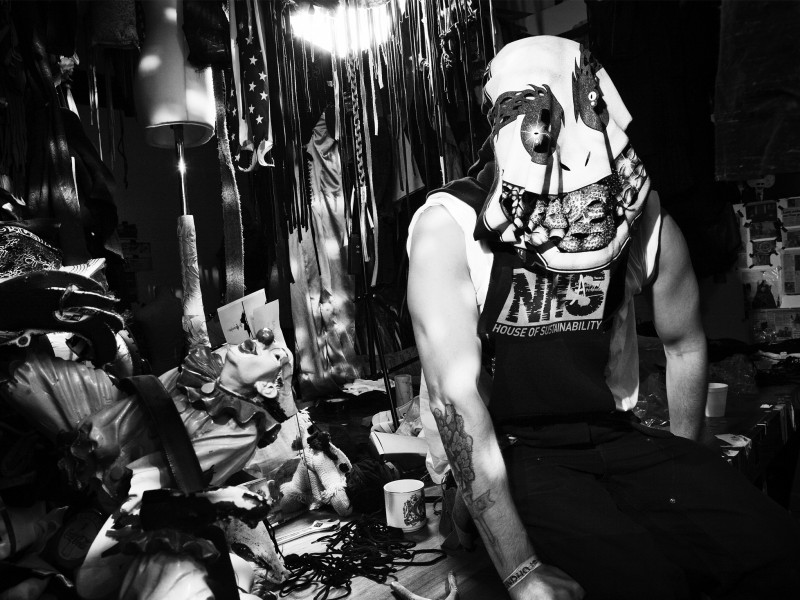Le Calandre, the three-star Michelin restaurant in Padua, northern Italy, is a curiously located affair. One expects it to be nestled in a light-dappled rural idyll, or set amongst achingly hip boutiques and concept stores. As it is, the fabled dining room, an outward manifestation of chef Massimiliano Alajmo, is set on the side of a dusty road in a nondescript suburb of the city. Car dealerships, industrial wholesalers and petrol stations dominate the landscape. The fact that it’s intensely sunny this afternoon is the one noteworthy feature.
On a junction known to every taxi driver in the region, lies the Alajmo family empire. Blink and you could miss it. In addition to the restaurant, the family owns and runs an adjacent café, serving mouth-watering pastries made with the finest olive oil. Across the street is their celestial delicatessen, In. gredienti, whose contents have been known to make grown men cry with delight. But it is Le Calandre that rules the roost around here. A modestly sized, mythical space where alchemy and intense experimentation come together to present some of the most exciting food in the world. If that sounds overzealous, it is meant to. Once you have sampled Alajmo’s food there is no going back.
The chef himself, a tall, affable character, more worried about his English skills than impressing me with mille-feuille, is awaiting my arrival in his office. It’s a space dominated by awards (he remains the youngest chef to claim three of those highly regarded stars), art, eclectic books and the souvenirs of success. On the table lies a small, opaque card bearing the quote: ‘Cuisine is like a needle that, passing through small holes, creating a thread so thin and strong it unconsciously binds us all.’
“I don’t want people to come here to learn anything, they must come here to enjoy. They should be leaving with a smile on their face. What we do is high concept, but you don’t come here thinking you are in a school or some kind of temple. Feeling good is my idea of digestion.”
Conversation wise, food is high on the agenda today, although this charming chef isn’t obsessed with the technicalities that often get in the way of more important matters. “I don’t consider my idea of cuisine to be technical, it’s not molecular,” he says in faltering English. “We try to feel the ingredients and understand what is inside the materials. It’s about natural and pure, not sophisticated chemical products. Technical purity is not so important to me as the relaying of good feeling. Technique is just a shortcut.”
Restaurants are in Alajmo’s blood. His grandparents founded the family business; his parents continued the tradition, winning their own Michelin stars along the way; and at the tender age of nineteen Massimiliano and his brother Raf were given the keys to the door. “My parents really gave us the ingredients to make something special. What we did was different, but the spirit remained the same. My mother in particular, who is a great pastry chef and can make the most amazing bread, shared her passion for flavour and integrity. Over time the restaurant has changed its look and location but the fundamentals remain the same. When it comes down to basics, what we all share is our dedication to the idea of being wholly natural.”
He is endearingly nostalgic when talking about his childhood, a period that obviously informs the kind of food he presents today. “When I was really young, maybe five years old, my mother would let me in the restaurant kitchen and I would help all the chefs. She always told me to go out and play, but being in the kitchen was much more enjoyable. I was the mascot! There is one thing in particular that is very strong in my mind, something my mother used to prepare at home, it was ricotta with castor sugar. The way she used the fork, and the crunch of the sugar, she had some cold milk and some cocoa powder. It was really very simple, but in that gesture there was awe. When something is very simple, it can be very strong. It really made an impression on my mind.”
Alajmo has continued to refine such techniques to produce food that owes as much to art and science, as it does memory. There is also a strong whimsical thread that connects his dishes. He famously devised a smoked broth by noticing how his mobile phone, placed next to a glass of water, infused the liquid with the taste of electricity. “For me it was very strange and reminded me of water from the past. That’s when I started experimenting and tried smoking pasta too. We use natural liquid smoke, so you can hardly taste it, but there is a little trace of memory in there, and that is the key ingredient.”
Senses play heavily in the orchestra of Alajmo’s imagination. “Smell is the fastest sense we have, but it is not rational. It’s not connected to the rational part of the brain, it’s in the emotional part. It means you sometimes cannot recognise the ingredients, but you can recognise the situation.” He sprays a light essence into the air as an example and wonders if its properties can be recognised. “Where are you now?” he asks, eyes bright with excitement. “Don’t tell me what you smell, but where you are.”
“A forest?” Comes my tentative reply. “Somewhere warm and clean?” “It’s actually the scent of bergamot, which I think is utterly fantastic. You thought it smelt clean, so imagine if you put it into something fatty, it will really clean the dish. We think about our food and are very careful with all the details, but when we serve it, the guests don’t realise that because they don’t see it. In that sense all the complexities stand out. We never come out to the guest and explain what we have done. No, we simply present it and let them draw their own conclusions. We only want to give them the best moments—only the cream.”
At Le Calandre, the experience is as much about ambience as it is food. Service is precise but warm, temperature and light carefully monitored. “When someone arrives here angry, they don’t leave that way, because I always smile in the restaurant. You have to create a good atmosphere, it affects the way the food is perceived. Our style of service is completely different to other restaurants, it should be like eating in your own house. Nothing here is superfluous. Cuisine must undress itself of the useless to rediscover the innocence of a child telling the story of his small world.”
The chef is in his element now, drawing on analogies that are as esoteric as they are poetic. “Think of what children draw to represent their experience of life: the house represents our desire for protection and reassurance; the flower—beauty, femininity, perfume; the sun—light, energy, nourishment, strength; the tree—nature and concrete; the cloud reflects a chord out of tune; the family – certainty, intimacy; the birds—lightness, freedom, travel; the road—what’s to come, the wait.”
These verbose flights of fancy are certainly evocative, but not everybody is satisfied with such description. “People ask me if my food is molecular, nouvelle, tech-emotional. I say forget all that. What I do is about fluidity. We go inside the ingredients to find the spiritual part of the material—the essence. After that we research the depth and the lightness. We only use natural ingredients and so the character and the spirit of the ingredients must come out. We respect and analyse the possibilities of all living matter. The pleasure that this brings is the most important thing.”
Dishes come and go, surpassing themselves with delicate infusions, highly researched flavours, and the lightness of touch so eloquently described. A risotto, famed for being the finest in the world, tastes otherworldly; gazpacho (‘Maxpacho’) sings in the mouth; and obtuse flavours such as coffee, lavender and the aforementioned electricity imbue ingredients with an edible sorcery that leaves the palette smiling.
There is method in this madness, although the inverted complexities and topsy-turvy approach is as obtuse as it is beguiling. “People think you should cleanse your palette before eating but that is not necessary. I say drink coffee before you start. Why not? You know coffee is the food of intellectuals. Tradition says that you normally finish a meal with a coffee, but in my world you could just as easily start with one. It’s not about cleaning the body, it’s about cleaning the mind. Food is not just about taste, it’s what you recognise. You have to keep an open mind about it, that’s my approach.”
As if to demonstrate this singular approach, he strides purposefully into the kitchen and returns with what appears to be a perfect oval of mozzarella. “Tap it,” he says passing a spoon. It cracks and breaks like a delicate goose egg, spilling unctuous almond foam into the dish. Call it dessert, call it art—either way it is catnip for the senses and typical of this man’s unerring imagination. “Never underestimate the eyes ability to play tricks on the mind. What you see is not always what you get.”
For more visit www.alajmo.it
Related Features
-
95
-
-
-

